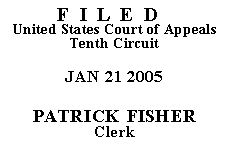

| UNITED STATES OF AMERICA,
Plaintiff-Appellee, |
|
| v. | |
| DANIEL JOSEPH PALERMO,
Defendant-Appellant. |
|
On August 29, 2002, Palermo pled guilty to possession of an unregistered sawed-off shotgun. Palermo was sentenced on November 11, 2002, to sixty-four months' imprisonment, to be followed by thirty-six months' supervised release. Palermo did not file a direct appeal. On July 11, 2003, Palermo, appearing pro se, filed a pleading entitled "MOTION FOR SUMMARY IMPOSITION OF NEW SENTENCING JUDGMENT." ROA, Doc. 1. In that pleading, Palermo asked the district court to vacate his sentence and impose "a new sentencing judgment" so that Palermo could perfect a direct appeal. Id. at 1. In support of his request, Palermo asserted that his defense counsel had failed to file a timely notice of appeal and had failed to communicate adequately with Palermo regarding his right to appeal. Id. at 6.
On August 28, 2003, the district court issued a one-page order construing Palermo's motion "as filed pursuant to 28 U.S.C. § 2255" and directing the United States to file an answer or response. Id., Doc. 3 at 1. Palermo objected to the district court's recharacterization of his motion. In particular, on September 19, 2003, Palermo filed a notice of appeal complaining that the district court recharacterized his motion without notice to him and without his consent.(1) Palermo also filed two motions with the district court asking it to stay the proceedings and toll the limitations period for filing a § 2255 motion.
On January 13, 2004, the district court issued a seven-page decision and order concluding that the performance of Palermo's defense counsel did not fall "below an objective standard of reasonableness," and denying Palermo relief pursuant to § 2255. ROA, Doc. 6 at 6. Palermo has since filed a timely notice of appeal.(2)
In Castro v. United States, 540 U.S. 375, ___, 124 S.Ct. 786, 792 (2003), the Supreme Court held that "a district court may not recharacterize a pro se litigant's motion as a request for relief under § 2255 unless the court first warns the pro se litigant about the consequences of the recharacterization, thereby giving the litigant an opportunity to contest the recharacterization, or to withdraw or amend the motion." That holding effectively blessed what had "been the law in our circuit for several years." United States v. Martin, 357 F.3d 1198, 1199-2000 (10th Cir. 2004).
As asserted by Palermo on appeal, the record in this case establishes that the district court failed to comply with Castro's directive. Specifically, the district court did not warn Palermo of the consequences of its recharacterization of his pro se motion, i.e., that the recharacterization would effectively bar Palermo from filing another § 2255 motion asserting additional claims. Nor did the district court, despite Palermo's protestations to the recharacterization, afford him the opportunity to withdraw the motion or amend it to include any additional claims that he might have. The result is serious: "by sua sponte treating his motion as one under § 2255, the [district] court essentially used up [Palermo's] one shot at attacking his conviction[] and sentence." United States v. Kelly, 235 F.3d 1238, 1241 (10th Cir. 2000).
To remedy this situation, "we will vacate the [district] court's order denying the motion and remand the case so that [Palermo] may make all of his collateral arguments in a single § 2255 motion." Id. at 1242. Although the one-year statute of limitations applicable to § 2255 motions would ordinarily bar any amendment or new motion at this point, we note that at the time the district court recharacterized Palermo's motion, Palermo had several months left in which to file an original § 2255 motion. In anticipation of Palermo amending his original motion or filing a new § 2255 motion on remand, "we hold that the limitations period" for him to do so "should be tolled from the date the district court recharacterized his motion as a § 2255 motion," on August 28, 2003, "until the date of this decision." Id. at 1243.
The district court's order denying Palermo's motion is VACATED, and the case is REMANDED to the district court for further proceedings consistent with this order.
Entered for the Court
Mary Beck Briscoe
Circuit Judge
*.This order and judgment is not binding precedent, except under the doctrines of law of the case, res judicata, and collateral estoppel. The court generally disfavors the citation of orders and judgments; nevertheless, an order and judgment may be cited under the terms and conditions of 10th Cir. R. 36.3.
1. We dismissed that appeal on October 8, 2003, based on lack of finality under § 1291. See United States v. Palermo, No. 03-4220 (10th Cir. Oct. 8, 2003).
2. On March 30, 2004, Palermo filed a pleading with the district court entitled "Motion to Vacate, Set Aside Under 2255." The district court concluded Palermo had not received authorization from this court to file a second or successive § 2255 petition, and accordingly transferred the pleading to this court. In response to our written notice, Palermo filed a "motion to compel" asking us to direct the district court to file the pleading as his first § 2255 motion. In support of his motion, Palermo asserted, in part, that the district court had improperly recharacterized his August 2003 pleading as a § 2255 motion. We ultimately decided to construe Palermo's motion to compel as a misdirected but timely notice of appeal from the district court's January 13, 2004, order.